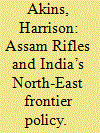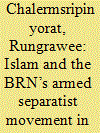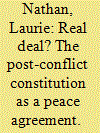| Srl | Item |
| 1 |
ID:
173394


|
|
|
|
|
| Summary/Abstract |
The Assam Rifles, the oldest paramilitary group in India, was formed as a defensive force to protect tea estates from tribal raiding. Following independence, the Indian government reversed British policy in the North-East frontier to extend administrative control over tribal areas that were largely neglected under colonial rule. In aid of this policy change, the government shifted the role of the Assam Rifles to an offensive counterinsurgency force. Based on primary sources, this analysis helps to demonstrate how post-colonial states co-opt colonial institutions to reflect new policies and the use of coercive force by paramilitary groups in the state-making process.
|
|
|
|
|
|
|
|
|
|
|
|
|
|
|
|
| 2 |
ID:
180280


|
|
|
|
|
| Summary/Abstract |
This article explores the reasons for adopting a particular interpretation of national identity and the dynamics of external and internal forces in determining a nation’s ‘ethical history’. The main analysis introduces conceptual innovations related to the problem of ethical cognition through which national identity is being determined based on cognitively unclarified determinants—in this study referred to as the EDCUD paradox. In this regard, the process of ethicization of national identity and the paradox of ethical cognition that emerges in the pursuit of its understanding has been identified as one of the main reasons behind the misuse of national identity in international relations. With that in mind, this study has attempted to create a theoretical setting that would help the analysis of individual cases of national identity in further research.
|
|
|
|
|
|
|
|
|
|
|
|
|
|
|
|
| 3 |
ID:
183459


|
|
|
|
|
| Summary/Abstract |
This article examines the roles of religion in the contemporary separatist movement in southern Thailand, whose violent campaigns have dramatically surged since 2004. It locates Islam in the region’s own political and historical context rather than viewing it as an expression of transnational terrorism or casting Islam as of secondary importance in what is seen as primarily an ethno-nationalist struggle, as some scholars have done. I argue that Islam served as a powerful motivational frame that drove thousands of Malay Muslims to take part in the violent struggle led by the Patani Malay National Revolutionary Front (BRN), as a sacred justification for their violent actions and as a blueprint of a new socio-political order. The conflict was elevated into a cosmological battle and the fighters’ actions were fundamentally framed within Islamic theology. Islamic law was employed as a primary reference for the justification and regulation of violent attacks. This article also demonstrates that Islam is part of the BRN’s political agenda and fighters have turned their perceived Islamic beliefs and norms into military actions. However, its ideological orientation is at variance with that of the transnational jihadists. This article offers a more nuanced approach to understanding the religious dimensions of this conflict.
|
|
|
|
|
|
|
|
|
|
|
|
|
|
|
|
| 4 |
ID:
093451


|
|
|
| 5 |
ID:
174553


|
|
|
|
|
| Summary/Abstract |
When intra-state armed conflicts end through a negotiated settlement, the conflict parties frequently agree to amend or replace the country’s constitution. Their aim is to entrench the settlement, address the conflict incompatibility, reform institutions and take other measures to prevent a recurrence of violence. This article argues that post-conflict constitutions (PCCs) should be understood as peace agreements. It motivates this argument on conceptual, functional and legal grounds. It demonstrates that PCCs comply with conventional definitions of a peace agreement, are an intrinsic component of the conflict resolution process and have a range of peace maintenance functions. As supreme law, they become the definitive peace agreement. Research on peace durability following negotiated settlements should therefore focus not only on comprehensive peace agreements (CPAs) but also on PCCs. PCCs should be conceived not as mere components of CPA implementation but as substantive political and legal agreements in their own right and as independent causes of peace.
|
|
|
|
|
|
|
|
|
|
|
|
|
|
|
|
| 6 |
ID:
174223


|
|
|
|
|
| Summary/Abstract |
Whereas there is a consensus on the significance of rebuilding conflict-torn states and societies, there is no agreement on how it should be done. The dominant framework of post-war rebuilding is clearly biased to rebuilding the ‘hardware’. This article argues that the government’s attempt to rebuild the Rwenzori sub-region in the aftermath of the Allied Democratic Forces war adopted the conventional approach that pays less attention to rebuilding ‘software’. It further asserts that the recovery programme was symbolic given that government wished to avoid the political consequences of not taking action at all. Symbolism not only led to flawed performance of the recovery programme but also negatively affected peace building in the sub-region. The article advocates not only for a synergy of rebuilding ‘hardware’ and ‘software’ but also for a nuanced approach that triangulates top-down and bottom-up approaches at all stages of post-conflict recovery.
|
|
|
|
|
|
|
|
|
|
|
|
|
|
|
|
| 7 |
ID:
178929


|
|
|
|
|
| Summary/Abstract |
With an increased focus on the role of pro-government militias in understanding intra-state conflict, scholars have primarily argued that states use militias as a proxy of the government because of low capacity or as a means of avoiding responsibility for violence against civilians. However, states with both high capacity and a willingness to commit violence against civilians have also relied upon pro-government militias in counterinsurgency operations. This paper argues that states involved in enduring interstate rivalries are more likely to use pro-government militias in order to reserve conventional military forces for potential conflict with their rival. Based on a case study of India’s Kashmir insurgency and logit analysis of pro-government militia data from 1981 to 2001, the findings provide empirical support for this theory and are robust to alternative measures and model specifications.
|
|
|
|
|
|
|
|
|
|
|
|
|
|
|
|
| 8 |
ID:
183458


|
|
|
|
|
| Summary/Abstract |
This article explores three interrelated components of the independence movement in Papua – armed resistance, political struggle, and international lobbying. As an insurgency, the armed resistance in Papua is local, sporadic and does not threaten Indonesian control. Indonesia’s predominantly military response to both armed and peaceful resistance has given violence a greater significance in the Papua conflict than the capacity of the armed resistance groups would suggest. The significant Indonesian military deployment and the associated human rights abuses have provided ammunition for pro-independence international lobbying. Notwithstanding a highly constrained political environment, activists continue to demonstrate after nearly 6 decades of Indonesian rule the capacity to mobilise support for independence harnessing issues such as racism. The article examines the Government’s dilemma that the means it has chosen to sustain its authority – an overwhelming military superiority – is one of the factors that fuels Papuan support for independence. What form of governance is possible in democratic Indonesia, when a portion of Papuan society does not consent to Indonesian rule?
|
|
|
|
|
|
|
|
|
|
|
|
|
|
|
|